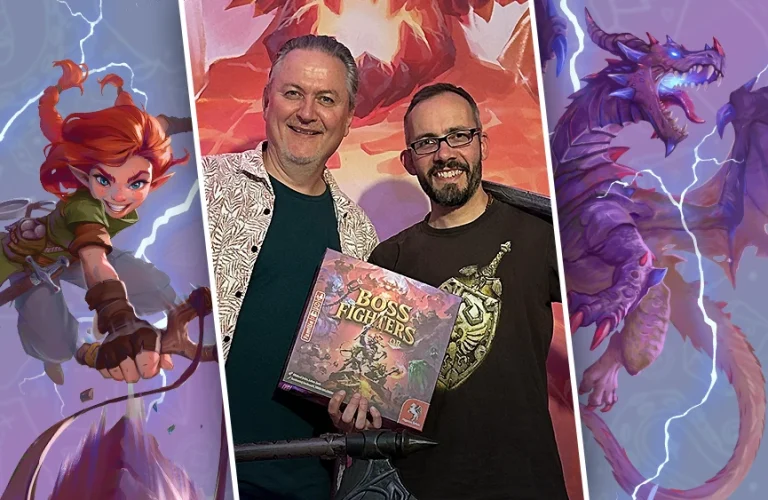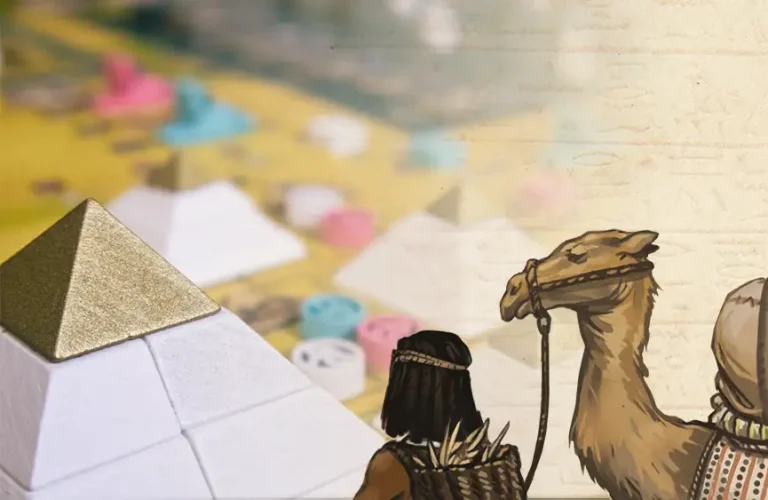Released at SPIEL’22, Spaceship Unity is an intergalactic action game unlike any other. Described as “A TV Series captured in a game,” this episodic cooperative experience will get your group up from the gaming table as your apartment transforms into the fully functional systems of an intergalactic space vessel.
To learn more about this high-energy and light-hearted romp in outer space, we present the following interview with the game’s designers – Jens Merkl and Ulrich Blum.
Prepare for warp speed!
In your Designer Diary about Spaceship Unity you already told us a lot about the game, the process of development and about you yourself. We’re happy to get an even deeper insight today.
Let’s begin: To whom do you particularly recommend Spaceship Unity?
Ulrich: “You have to have fun delving into a story because first and foremost the game is about the experience and the fun of playing as a spaceship crew with your friends.“
Jens: “Spaceship Unity can be super immersive. It’s always nice to see that at some point the test players begin to refer, for example, to their vacuum cleaner as their jump drive. You grow together as the crew; everybody plays an important part in the story and has the opportunity to bring and show their skills.”

Do you have any interesting or funny stories of the development process that you want to share with us?
Jens: “I instantly think about a playtest in August during a 40º Celsius heat wave (or 104º Fahrenheit). It was many years ago and we brought some people together to play a whole episode of Spaceship Unity which consisted only of Action Chapters. Action Chapters are time based and motivate players to move faster in order to complete everything on time. They were drenched in sweat by the end of it! 😀
While recapping this interesting session we invented Challenge Chapters, that aren’t time based, which present challenging tasks where the players must concentrate more.
Another funny moment was adding ‘Make sure to wear something on your feet that will prevent you from slipping’ to the rules because we had a player injure themselves during testing. (Greetings to Stuggi!) This test group always gives 100% and is really great. They are our first point of contact when we want to test if a chapter is generally too hard or if we want to design a difficult chapter because of the story but be sure it is still doable. So, if you ever think that a chapter is just too difficult to complete, you always know that the test teams have succeeded ;-)!”
Was your initial idea to create a cooperative game or did it happen during the development?
Jens: “It came with the story. When we decided that the story would be about unity and that we challenge ourselves together on the journey into the unknown, it was clear that it needed to be cooperative.”
Had you already worked with Pegasus Spiele in the past or was this your first time?
Jens: “It was the first time for me.”
Ulrich: “In 2020 I published Doodle Dungeon with Pegasus Spiele and already had a good experience with the team. I also learned that you need to be courageous in order to develop more unusual games.”
How was it working with our editorial team?
Ulrich: “Basically, it started out like a classic collaboration. You take your game idea there and then you work with a good editor with whom you start the development process. As mentioned before, we quickly realized that it was a lot more work than we thought. It was so much work that at some point the roles got a bit mixed up and there could have been even two or three editors working on it.”
Jens: ”Of course, no publisher can afford this. That’s why we had to collaborate and support much more than usual. Both during the testing process and additional development. We reached a level of complexity during development that only the two of us could really delve into the depths of the story world and all the links in the story. But as I said, that doesn’t mean that we didn’t keep the editorial team and many others in the publishing house busy with the project. They are all doing an amazing job and at times pushed far beyond their capacity limits with extra shifts that were necessary to complete the project.”
Normally there are a lot of test sessions before a game hits the market. This has been a challenge through the pandemic. How did you deal with that? 
Ulrich: “First we thought: Oh no, what should we do now? But then we realized that we’re pretty damn privileged compared to a lot of our colleagues who had to immediately switch to tabletop simulators, for example. That wasn’t an option for us because the game simply doesn’t work like that. We had a well-tested first episode in early 2020, so we knew it worked. But we still had sooo much to write and link the story with mechanics and decided we’d take our time with it. That’s why in 2020 we focused exclusively on that portion of the design. It wasn’t until the end of 2020, when people were more familiar with Zoom, that we started testing again. That went surprisingly well via video.”
Jens: “We invested a lot of time to develop a good story, more than we thought in the beginning, but it felt appropriate because that is part of our background – Ulrich studied acting and I went to the film academy. We also got advice from a good friend, Daniel Danzer, who is a screenwriter and game designer. At some point we thought: why don’t we just send people the game and do test rounds via Zoom? We had to quickly produce five games with about 2,500 cards to test with different groups, and thought everything would be easy. Well, we discovered that it wasn’t possible to cut it all ourselves and put it in bags, so we had the prototypes printed.”
Ulrich: “That was just too much work. I once made a prototype in 1 ½ days but did nothing else during that time. Jens then suggested we get it printed.”
Jens: “This form of testing had more advantages. Using Zoom, the playtesters quickly forgot we were there to observe and soon let loose. For us it was easier, we just observed more and did not interfere with what was happening during the game. Also, the test group could place more mobile phones through the apartment so that we could see everything that was happening. Recording to watch it another time was also an option.”
In the end, let’s leave Spaceship Unity and talk about you. What do you do besides design games and what are your favorite games at the moment?
Jens: “We’re both full-time game developers. In my free time, boardgames plays a big role as does music. I fell in love with a ukulele two years ago.”
Ulrich: “I like to go to the theater or the opera. I also watch way too much TV and read a lot.”
Jens: “I like Boardgames like Splendor, Word Slam, Ark Nova, Lost Ruins of Arnak and Detective.“
Ulrich: “Generally I like to play almost anything except for heavy Eurogames, which I don’t look for right now. I finished the campaign for Sleeping Gods recently. Now I need to find the time to play it a second time.”
Jens: “Two very important aspects, I think for us both, that we enjoy in a game are experiences and emotions.“
Two things that Starship Unity is filled with!
Questions, comments, feedback? Share your thoughts with us at blog@pegasus.de






